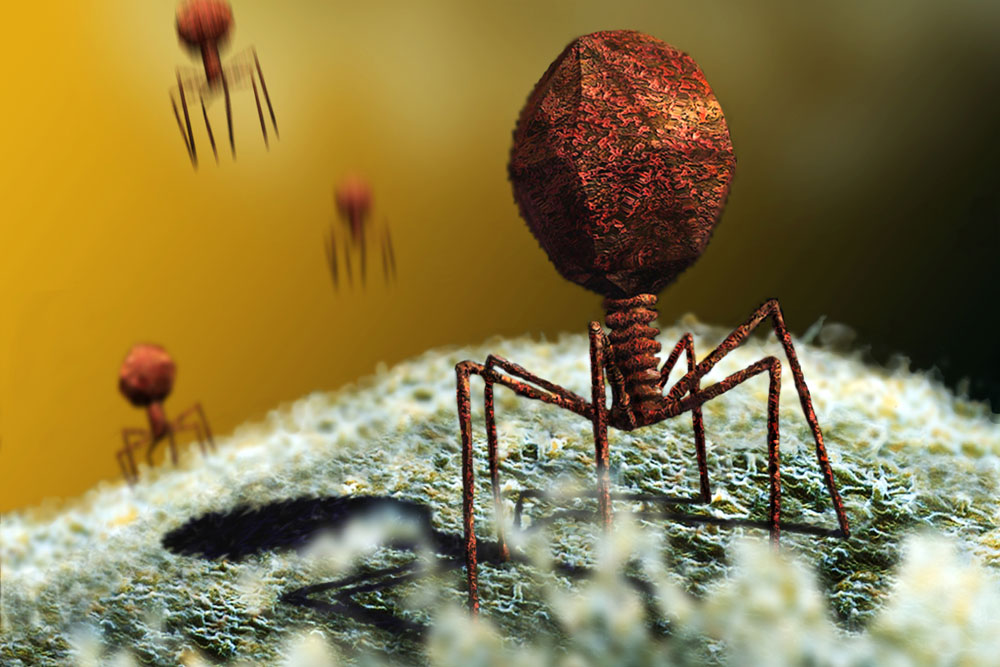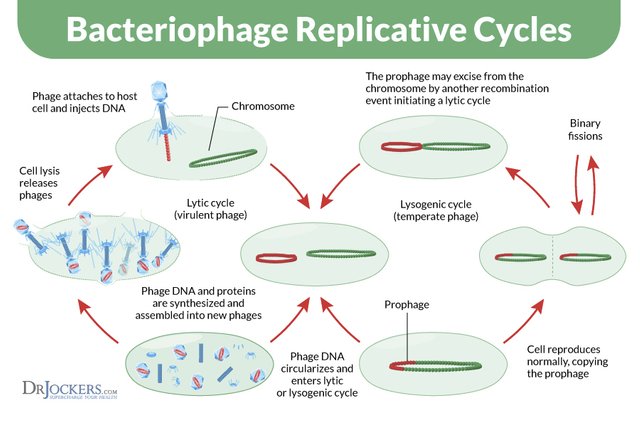Viruses that Infect Bacteria -- Could Bacteriophages be a Go-to Alternative??
In the early twentieth century, researchers actually believed DNA -- the essential genetic material which makes up every living organism -- to be a useless molecule because it was just 'too simple.' Researchers went on to later find out that viral DNA is an essential component for phage replication, which demonstrates that DNA is, in fact, the necessary molecule for viral replication to occur. With this being said, bacteriophages, or bacteria infecting viruses, were the ultimate reason for this particular biological discovery to occur in the first place.
Bacteriophages are extremely simple in nature and are found everywhere in our society, but they are quite difficult to understand because they often times do not follow the basic historical rules of Biology. There are many mysteries about these extremely versatile viruses, but there are also a number of known roles which phages are able to play in our society, as well. Some of these include: their exceptional ability to cooperate with bacterial host cells in order to affect the environment (both positively and negatively), the role in which they play with disease and etiologic agents, their roles in symbiotic relationships, and more.
Bacteriophages interact with a bacterial host by attaching on to a bacterial receptor and then injecting their DNA directly inside the host cell. After the DNA has been injected into the host, cell replication of the phage occurs until the host bacterium lyses and new phages are released. As previously mentioned, phages have the ability to affect our environment in many different ways. For example, phages have been identified as a potential source of genetic soil changes, heritable changes in vegetation and ocean waters, the processes of biological evolution, as well as climate change, just to name a few.
Phages are continuously being studied by researchers because there is so much information about them that we still do not know. Phage therapy and phage genomes, for example, are a couple of areas where we are still lacking complete knowledge and a full understanding. In some industries, phage treatment is becoming more and more popular as we continue to learn more about these complex viruses.
To illustrate, lytic phages are being used as a bacterial control mechanism in the food industry, farming practices, as well as with specific antibiotic treatment protocols. Phages also have the potential to help fight against the devastation of a number of plant species by mixing them directly with certain pesticides that are being applied to our crop supply.
All of these phage discoveries which are still currently being studied, monitored, and expanded upon may potentially be able to provide enormous advancements to occur in regards to the immense field of biological sciences. The barrier which seems to be holding us back, however, is the fact that they are extremely difficult to fully understand due to their extremely rapid rates of replication.
Phage research is an extremely vital aspect of biology because if we can encode some of these unknowns and make further advancements in categories where we are less proficient, then we could ultimately make some enormous changes in our society for the better. A more sustainable future can be made possible with the help of bacteriophage research.



Hello @conradsuperb, a very nice article with an intriguing idea! In these days of multiple antibiotic resistant bacteria causing life threatening infections it’s good to think outside the box and this idea fits that criterion. Thanks, I look forward to reading more.
Thanks for stopping by to take a look!
We definitely need to be thinking ahead, that's for sure, because multi-drug resistant bacteria are only going to continue mutating to fight off more and more of our treament methods.... we have to begin now while we can in order to try and get ahead, although this is going to be very tough
Cheers !
You got a 16.98% upvote from @upmewhale courtesy of @conradsuperb!
Earn 100% earning payout by delegating SP to @upmewhale. Visit http://www.upmewhale.com for details!
This post has received a 15.67 % upvote from @boomerang.
To listen to the audio version of this article click on the play image.

Brought to you by @tts. If you find it useful please consider upvote this reply.
Isn't this basically the same mechanics behind CRISPR.
I believe there are some Biotech companies beginning to engineer their own bacteriophages in order to use CRISPR-Cas 9 genome editing to kill target bacterium.
Development of phages can actually turn the bacterial immune system known as CRISPR against itself. Phages target the resistant bacteria, and then the CRISPR system incorporates the DNA with specific instructions for a modified guide of RNAs which hone in on part of an antibiotic-resistance gene. Once that phage, then infects a bacterium, the guide RNA latches on to the resistance gene, which prompts the enzyme, Cas3, to destroy the genetic sequence instead. Cas3 eventually destroys all the DNA, killing the bacterium altogether.... So we are seeing phages beginning to be used more frequently in the mechanics behind the CRISPR-Cas9 gene-editing system.
Hope this answered your question-- keep steeming my friend :)
HELL-NO!
Its already DIFFICULT to counteract the rapid development of immunity in bacteria to antibiotics. But Virus or bacteria-phages could be used except only for the few handful of people that need the treatment.
Virus mutates thousands of times greater than the bacteria so side-effects and UN-charted consequences are possible.
Yeah well isn't that exactly why we need to be exploring different methodologies and techniques to help against the rise of superbugs?
antibiotics-- even second and third class treatment options are no longer working against the pesky, mutated bacterium causing numerous diseases worldwide, especially in the world's most vulnerable populations. Research in this field has to continue, regardless of whether or not these things you mention are true.
Phage therapy, new discoveries such as malacidins, CRISPR-Cas 9, you name it -all need to be further explored to help this growing public health crisis
Ok cheers!
Cheers mate! I see you are fairly new to steemit -- welcoming you here with open arms!
Best of luck on the start of your journey here, STEEM on :)